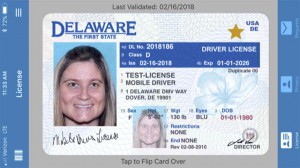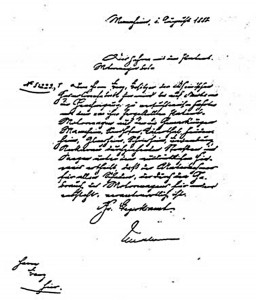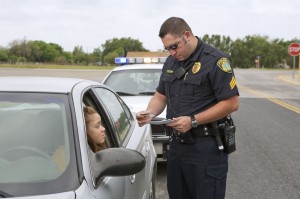You can make reservations, buy groceries, pass through airport security and pay bills with your smartphone. Now, the State of Delaware wants to see if it makes sense to let motorists use their smartphones as mobile driver’s licenses, rather than issuing conventional plastic or paper cards.
The Delaware Division of Motor Vehicles has launched a six-month pilot program in which 200 state employees and other “stakeholders” will participate. The “mDL” project is meant to test the effectiveness of using a license app – and also to make sure it can remain secure from hackers. It could eventually be rolled out to Delaware’s 800,000 licensed drivers and eventually copied by other states.
“This six month pilot will help us see what mDLs look like in real-world scenarios and address any issues that arise as a result before we decide to fully adopt and implement this application for our more than 800,000 licensed drivers and ID card holders,” said Delaware Secretary of Transportation Jennifer Cohan.
In one form or another, the driver’s license has been around for a long time. Karl Benz, traditionally credited with inventing the automobile, needed written government permission to test his Patent Wagen on public roads.
(Toyota, Honda and Subaru tops in brand loyalty. Click Here for the story.)
Mandatory licenses became common in many parts of Europe during the first years of the 20th Century, and as accidents and fatalities began to rise, New York became the first state in the U.S. to issue licenses in 1910, although the rules initially applied only to licensed chauffeurs. Neighboring New Jersey started requiring licenses – and driver testing – for all drivers three years later.
Today, licenses not only serve as proof that a person can legally operate a motor vehicle but also provide an essential identity check for everything from voting to buying alcohol and tobacco to passing through airport security.
Throughout the years, licenses have been significantly upgraded, in part to prevent forgeries but also to provide additional information. Michigan, for example, issues an “enhanced” license that residents can use as an alternative to a passport when driving across the border into Canada.
(Click Here to see what automakers dominated the Consumer Reports top 10 cars list.)
Delaware authorities are hoping that their new mDL can take things to the next level. For one thing, a motorist won’t have to remember their wallet, simply their smartphone, to get behind the wheel. And mDLs could become an important tool for law enforcement. Rather than having to walk up to a vehicle following a traffic stop, an officer will be able to ping a driver’s smartphone to check their identity, check their driving record or learn if there might be outstanding warrants.
But one of the challenges faced by the Delaware DMV and IDEIA – the company that both produces traditional licenses and is running the mDL test – will be to ensure that hackers can’t also access the information stored on the mobile license.
There are some potential privacy advantages to the mDL, according to a news release issued by the DMV. For one thing, a motorist will be able to use the app to verify their age without also revealing personal information such as their address, birthdate or driver’s license number. The license holder will be able to control what information is accessed, whether by using a PIN number or facial recognition.
“Keeping our personal information secure continues to be an important issue and I am proud to have sponsored the legislation to allow for this pilot study to move forward,” said Delaware Senator David McBride, one of the sponsors of the legislation authorizing the pilot program.
(To see more about Dodge shaking down the competition with its new “Shakedown” package, Click Here.)
Among other things, the DMV said in its statement that it will be following:
- Business acceptance – understanding how businesses that require identification or age verification interact with the mDL will be advantageous throughout pilot.
- Ease of Use – ensuring the mDL is able to be presented to any organization without difficulty.
Delaware becomes the third state to test the idea of an electronic driver’s license, following Virginia and Iowa. Neither of those pilot programs has been followed up on a statewide basis. The Delaware program will run for six months before regulators and lawmakers consider whether they will make mDLs more widely available.



